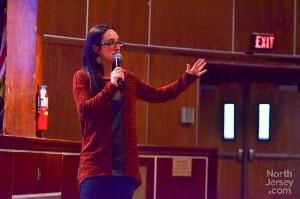Super Bowl XLVIII: Not All Fun and Games
Teenage Abuse Also Abounds
On Thursday, Jan.16, 2014, DMAE’s Youth Coalition against Human Trafficking held three assemblies in the DMAE Dizzy Gillespie Auditorium for students to learn the truth about the objectification of women who are marketed for sex. Liz Corsini and Maria Mulry from The Zone lead this student run group. The timing of the assemblies was important because with the Super Bowl taking place in New Jersey there would be abuse of teenagers who have become part of a sex trade culture.
“The number [of human trafficking cases] are expected to spike during the time around the Super Bowl,” said junior Amanda Grupa, a member of the coalition. “So we are trying to bring awareness to this very real topic.”
Amanda was one of four dedicated juniors who made up the Coalition this year and organized the assemblies.
“I’m very proud of the power of our youths’ voices,” Ms. Corsini said. “Juniors Alexandra Dul, Amanda Grupa, Karolina Krupa and Cristian Milevski should be commended for their commitment to and leaning more about this serious issue.”
Human trafficking is a topic that not many high school students are aware of and the Coalition wanted to shine a light on the subject. They did so with the help of three passionate speakers dedicated to helping victims of human trafficking crimes: attorney Lauren Hersh, the director of Equality Now, Keyla Munoz, an FBI agent who works in the Victim Specialist Unit, and Assemblywoman Jennifer Holdsworth who helped pass the Human Trafficking Prevention, Protection and Treatment Act. Assemblywoman Valerie Huttle, who also supported the Act, was unable to make it but glad to know that students were going to become aware of this oppression.
“Having speakers who are speaking to you in a way that is similar to a conversation is the best way to convey important information,” Karolina Krupa said.
During the assemblies, the three speakers took turns, like a tag team with ever increasing speed, telling students the unbelievable facts about the abuse of young girls as well as boys.
“Thirty two billion dollar’s worth of money is made by human trafficking in the world,” director of Equality Now Lauren Hersh began. “And the people they target are 13-16 years old.”
FBI agent Keyla Munoz used some examples of hotspots in “the game,” that were not “too far from the corner.” As Munoz explained, they have seen a spike in human trafficking in neighborhoods like Englewood. Her main point was to drive the idea that no area is shielded from this exploitation.
“We, [the FBI], are working on making cities safer by observing and acting appropriately. No place is ‘in the clear’ from the human trafficking but we are combating this on a daily basis,” Munoz explained.
She gave examples of girls she was in contact with at one point in her career that shocked the students. For example, she told of one of a nine year old girl who was a victim of this human trafficking, one of the youngest victims her unit had seen. She addressed students directly and told her stories candidly so students could easily comprehend and feel the same outrage that she felt.
Assemblywoman Jennifer Holdsworth explained the uphill battle to get the legislation started and about her determination to get it passed. Although it has taken time to process the bill, finally some new ground was broken by Holdsworth. Her bill, recently passed in a legislative vote, will bring more and more justice to human trafficking victims in New Jersey.
“We have been constantly and consistently working on raising awareness about human trafficking and finally we are getting through. With this bill that is now set up, we are able to get out on the street and protect innocent people. It is a prominent issue that will not be ignored,” Holdsworth said excitedly.
Despite the growing number of human trafficking cases, these women were encouraged that the DMAE Youth Coalition against Human Trafficking Coalition had taken the initiative to raise awareness in their school to combat the growth of such horrible oppression.
Ms. Corsini add that they should be commended for “helping to protect their peers.”



